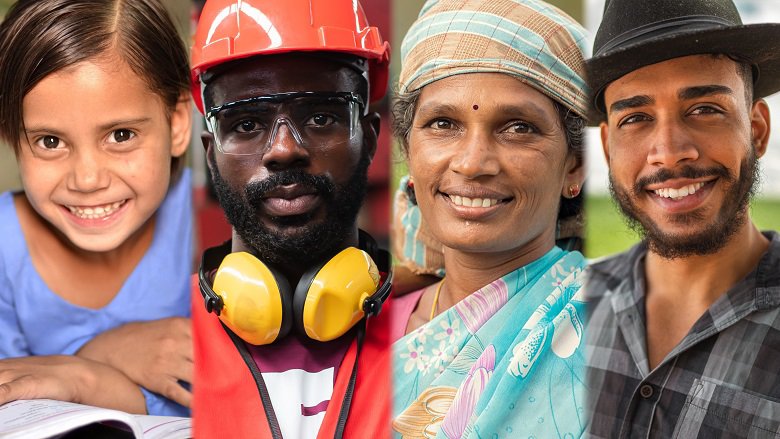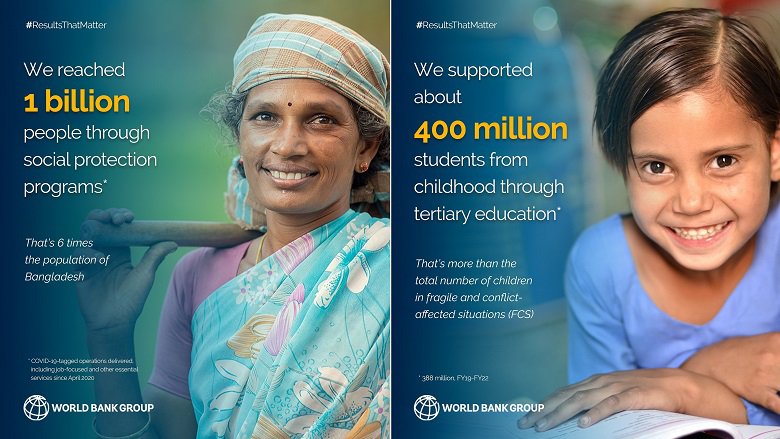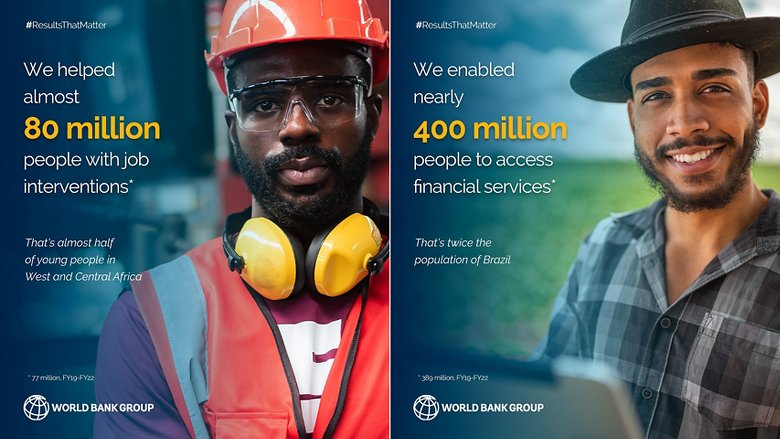Amid multiple global crises, the World Bank Group (WBG) continues to deliver strong results by responding to the immediate needs of countries, helping millions of affected people, building strong foundations, and paving the way towards a green, inclusive, and resilient future.
The WBG’s Global Crises Response Framework supports clients navigate these challenges and stay the course toward long-term development outcomes. The Framework will make available up to US$ 170 billion in financing from April 2022 through June 2023, including up to $30 billion to address the ongoing global food crisis. This follows the largest crisis response in history, mobilizing $200 billion in April 2020- March 2022 to help countries fight the health, economic, and social impacts of the pandemic, while keeping focus on the climate agenda.
We recognize that this surge financing must be paired with a continued focus on results to build a sustained foundation for recovery. Newly released data from the WBG Corporate Scorecards, one of our main reporting mechanisms, shows our unwavering support to countries in this difficult time to protect hard-earned development gains in critical areas. The WBG reached 1 billion people through social protection programs since the start of the pandemic, saving lives, providing essential services, and promoting jobs. Over the period from fiscal year 2019 to 2022, we supported close to 400 million students, from early childhood to tertiary education, a threefold increase from fiscal years 2015 to 2018 and enabled nearly 400 million people to access financial services.
Our results focus is increasingly centered on outcomes, enabling client countries to attain their long-term development goals and improving people’s well-being. So, while we are supporting immediate responses to COVID-19, we are also working to build resilient health systems to ensure a sustained recovery. Since the beginning of the COVID-19 pandemic, we have supported 78 countries with vaccine financing and helped administer an estimated 400 million doses. At the same time, we are helping build health systems and capacity, equipping over 1,500 labs training more than 320,000 healthcare staff. For example, in the Philippines, the WBG delivered 33 million doses of vaccine, while strengthening the national health system through an expansion of the country’s laboratory capacity at the national and sub-national levels.
We are also prioritizing climate action like never before. We are partnering with Egypt to build a greener and cleaner future for its people through the Benban Solar Park, one of the largest solar installations in the world. Benban is expected to avert an estimated two million tons of greenhouse gas emissions a year—equivalent to taking around 400,000 cars off the road. On the adaptation side, we have supported 98 countries mainstream disaster risk reduction as a national priority. And we have rolled out a new core diagnostic tool, the Country Climate and Development Report (CCDR), to help countries align climate action and development efforts.
We are also seeing results in other important areas, such as building food security and decreasing fragility. Between fiscal year 2019 and 2022, we reached approximately 50 million farmers with agricultural assets and services. In fragile and conflict-affected situations (FCS), we are working across sectors to help vulnerable populations in places like Yemen, where we are supporting an urban services project that has enabled 1.2 million people to access clean water and sanitation.
As the WBG continues to act with urgency, we are keeping steady focus on our monitoring and evaluation (M&E) systems. Our outcome ratings produced by the Independent Evaluation Group (IEG) have steadily increased, with 83 percent of WB operations being rated satisfactory. Our M&E rating, at 61 percent, surpassed its target this year for the first time, likely contributing to the sustained improvement in outcome ratings. Client satisfaction, too, has increased steadily, even in the midst of the pandemic. And we are monitoring how our operations promote progress toward reducing gender gaps, with over 90 percent of WBG operations now deploying such indicators.
At a time of scarce resources and competing priorities, we are also improving our operational efficiency, including by mobilizing private capital to boost our financing—to the tune of US$33 billion in the past four years, the largest volume in a period of depressed private investments. But we know that ultimately, we need to do more. During the past Annual Meetings, our shareholders commended the Bank for its record crisis response and asked us to launch an Evolution Roadmap by the end of the calendar year. This is a recognition that the Bank has the capacity to increase its financial, knowledge, and convening services to address global challenges and to deliver development impact in the countries that it serves, as shown in this year's Corporate Scorecards.



